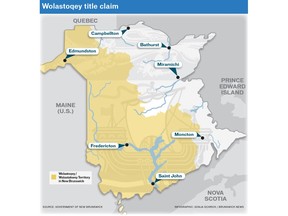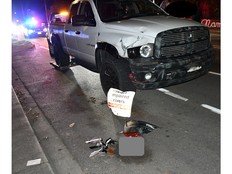Editorial: Strike private land from big title claim
Both sides say they want to negotiate. But there’s nothing to negotiate until everyday New Brunswickers are fully removed from this action.

Article content
The Wolastoqey First Nations say they want to settle their case against New Brunswick. Premier Blaine Higgs says that’ll only happen if they remove private property owners from the lawsuit. Who’s right?
Aboriginal title is an evolving area of the law, as all sides have acknowledged. We don’t profess to know the finer points of what even the lawyers don’t agree on yet; but we do see some obvious practical problems with this declaration applying to private lands.
Mr. Higgs’s posture on Indigenous issues is certainly open to criticism. But he and his attorney general Ted Flemming are right to be dubious of the Wolastoqiyik’s “nothing to see here” approach to an unsettling part of their claim.
We see no reason to disbelieve Indigenous leaders that their intention isn’t to defenestrate hundreds of thousands of white folks. But why not, then, formally remove those parcels from the declaration, so the rest of the argument can more easily proceed?
The Supreme Court has written that Aboriginal title “encompasses the right to exclusive use and occupation of the land.” Clearly the overall issue is more complicated – but still, those words are pretty plain.
At the very least, it would seem Aboriginal title over these private lands would entitle the Wolastoqiyik to disrupt economic development, even if no Indigenous people live in the community in question
The Indigenous litigants say they want to be compensated for the loss of private land owned by “strangers to the claim,” instead of repossessing those lands. And yet, they aren’t proposing that, in exchange, this compensation would extinguish their Aboriginal title thereafter. By their interpretation, it would continue.
What, then, is the purpose of including these parcels of land – if First Nations don’t want to repossess them, and if their interest extends beyond the money?
No one has definitively answered this question yet. But former appeals court justice Joseph Robertson – a respected legal mind who’s penned a primer on the case for our readers – has deduced the Indigenous plaintiffs want to establish “a right to be consulted and accommodated in cases where the lands of an unnamed defendant are about to undergo development…” He gives the example of resource development.
This may seem innocuous – who, after all, is against consultation? It’s a word we ordinarily understand to mean inviting someone’s input. But think about it: When asking to be consulted, the Wolastoqiyik would be armed with a declaration – a constitutional declaration – that they have a “right to exclusive use and occupation of the land.”
Consult us and agree with what we want? Fine – if you like your house, you can keep your house. But disagree with us? Maybe things won’t be so cordial.
In their legal brief to the court for the current motion hearings, the Wolastoqiyik’s counsel argue that Aboriginal title and private property can co-exist – pointing to ongoing cases elsewhere in which litigation is ongoing. Let’s say, for the sake of argument, they’re right: It’s still worth contrasting the fundamentals of Aboriginal title with Crown title, and what they entail for property owners.
After all, property rights aren’t absolute. The Crown’s underlying title gives the government the right to override the wishes of a property owner in the public interest.
Yet, there is a high burden in doing so. And the authority of who represents the Crown, and by extension the public interest, is democratically accountable. And subject to petition. And subject to judicial review.
We see no reason to disbelieve Indigenous leaders that their intention isn’t to defenestrate hundreds of thousands of white folks. But why not, then, formally remove those parcels from the declaration, so the rest of the argument can more easily proceed?
At the very least, it would seem Aboriginal title over these private lands would entitle the Wolastoqiyik to disrupt economic development, even if no Indigenous people live in the community in question, and even if there’s a significant advantage to the actual residents. And on whatever grounds they please.
Put it another way: We’re talking about the potential of a few thousand people, by ethnic privilege – who may live hundreds of miles away – imposing political conditions on everyone else, accountable only to themselves. That doesn’t sound much like democracy.
Indeed, it sounds nothing like the causes of equality, accommodation and self-government that have quite rightly been put forward as conditions for reconciliation with our first peoples.
Both sides say they want to negotiate in good faith. We hope they’re sincere. But there’s nothing to negotiate until everyday New Brunswickers are fully removed from this action. In the interest of fairness, the judge’s choice should be obvious.












Postmedia is committed to maintaining a lively but civil forum for discussion. Please keep comments relevant and respectful. Comments may take up to an hour to appear on the site. You will receive an email if there is a reply to your comment, an update to a thread you follow or if a user you follow comments. Visit our Community Guidelines for more information.